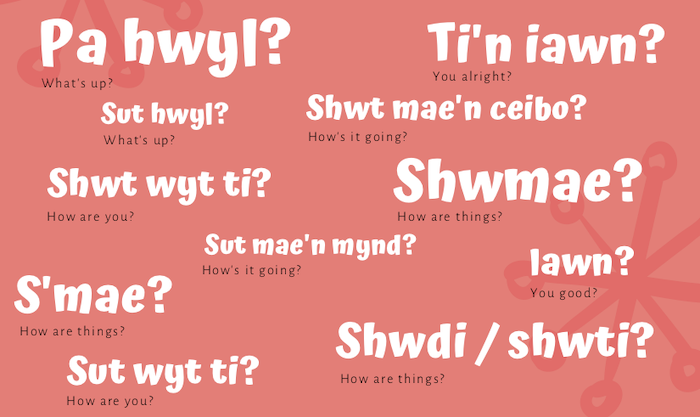When you sign up for a Welsh course, one of the very first survival phrases you’ll learn is “How are you?”. This cyfarchiad (greeting) can be expressed in two different ways:
- the colloquial Sut wyt ti? (NW) / Shwt wyt ti? (SW)
- the formal or plural Sut dach chi? (NW) / Shwt ‘ych chi? (SW)
Sut wyt ti?
How are you?
Another casual greeting you’ll certainly encounter is Sut mae? (Hello, how are things?) which is pronounced as Shwmae? in the south or S’mae? in the north.
Now, there’s nothing wrong with any of these textbook greetings, but as in every language, native speakers love to spice things up with creative expressions. Let’s have a look at a few of them now!

Pa hwyl / Sut hwyl / Sut mae’r hwyl?
These informal expressions featuring hwyl (“fun” or “mood”) are very similar to the greeting “What’s up?” in English. The literal translation is along the lines of “What mood (are you in)?”
Pa hwyl?
Sut hwyl?
Sut mae’r hwyl?
Sut / Shwt wyt ti…?
Welsh speakers love tacking terms of endearment onto the end of Sut/Shwt wyt ti? when greeting family members, friends and other close acquaintances. Some popular ones I’ve come across before include:
- boi (boy) or bois (boys)
- mêt (mate)
- del (pretty)
- blodyn (flower)
- gwas, was or ‘washi (servant/lad)
- poni (pony)
- blew (hair)
- cariad (love)
- pwt (little one)
- byt (pal, buddy)
Note that you should avoid using any of these with people you don’t know very well or those who are older than you.
Ti’n iawn?
The most common way of greeting people these days is with the expression Ti’n iawn? (You alright?) or just Iawn? if you want to keep things short and sweet. Feel free to use this one with your favourite terms of endearment as well!
Ti’n iawn?
Sut/Shwt mae…?
There is a handful of verbs that can be used with Sut/Shwt mae’n… the most common being:
- Sut mae’n mynd? (How’s it going?)
- Shwt mae’n ceibo*? (How’s it going?)
(Ceibo comes from the verb ceibio which literally means “to dig with mattock, hoe, delve, pare surface of land.”)
As in English, you can also use the expression “How are things?” which translates as Sut mae pethau? in Welsh.
Shwt mae’n ceibo?
How‘s it going?
Shortening “Sut/Shwt wyt ti”
In some parts of Wales such as Carmarthenshire and Pembrokeshire, the phrase Sut/Shwt wyt ti? will merge into the single word shwti or shwdi depending on your pronunciation. Personally I think it sounds quite cute!
shwti / shwdi
Erbyn hyn
I’ve noticed that Welsh speakers often attach erbyn hyn (by now, by this time) onto the end of Sut/Shwt wyt ti? when speaking to someone they know has been unwell. For example:
- Sut wyt ti erbyn hyn? – O, dw i’n well o lawer, diolch. (How are you now? – Oh, I’m much better, thanks.)
Sut wyt ti erbyn hyn?
How are you nowadays?

